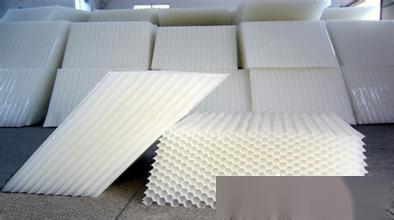The honeycomb inclined tube is a commonly used sedimentation tank filler in the water treatment industry. However, the quality of the honeycomb inclined tube filler determines the lifespan of the honeycomb inclined tube and whether the welding installation can be carried out smoothly. Now, Jinrong honeycomb inclined tube experts will teach you how to identify the quality of the inclined tube. There are two types of hexagonal honeycomb inclined tubes: inclined tubes and straight tubes, with materials including polypropylene (PP), polyvinyl chloride (PVC), and fiberglass.
Application Range of Honeycomb Inclined Tube Fillers:
Honeycomb inclined tubes are mainly used for various sedimentation and sand removal functions. They have been widely adopted in water supply and drainage projects over the past decade and have become a key water treatment device. They have advantages such as a wide application range, high treatment efficiency, and small footprint. They are suitable for sand removal at the inlet, general industrial and domestic water sedimentation, wastewater sedimentation, oil separation, and tailing concentration treatment. They are applicable for both new projects and the renovation of existing old tanks, achieving good economic benefits.
The main uses and specifications of hexagonal honeycomb inclined tubes include: specifications for drinking water sedimentation inclined tubes φ35X0.45, φ35X0.5; for wastewater, φ50X0.45, φ50X0.5, φ80X0.6, and φ80X0.8. The price of honeycomb inclined tubes for drinking water is higher because they must meet drinking water standards and must be made of non-toxic PP material. Prices range from over 400 to over 500 yuan per cubic meter, while the price of honeycomb inclined tubes for wastewater ranges from over 300 to over 400 yuan. Dongying honeycomb inclined tube prices are reasonable, and there are many manufacturers of hexagonal honeycomb inclined tube fillers, including suppliers of honeycomb inclined tube fillers, polypropylene honeycomb inclined tube fillers, ethylene-propylene copolymer honeycomb inclined tube fillers, and information on honeycomb inclined tube filler welding processes. Honeycomb fillers include inclined tubes and straight tubes, with materials available in PP and PVC. The inclined tube is mainly used for sand removal at the inlet in water supply and drainage projects, industrial and domestic water sedimentation, wastewater sedimentation, oil separation, and tailing concentration treatment. It can also be used for the renovation of old tanks. The main characteristics include a large wet perimeter, small hydraulic radius, good laminar flow state, and particle sedimentation unaffected by flocculation interference. The straight tube is used for tower-type biological filters, high-load biological filters, submerged biological filters (also known as contact oxidation tanks), and microbial carriers for biological rotors. It is mainly used for biochemical treatment of industrial organic wastewater and municipal sewage, with processing efficiency higher than that of activated sludge tanks, and a smaller footprint; the aeration intensity is lower than that of activated sludge tanks, and there is no need for sludge reflux; the sludge volume is small, and adaptability is strong, greatly reducing the workload after sludge dewatering. Currently, filtration processes often experience surface caking or clogging of the sand layer, resulting in actual backwashing strength and time far exceeding design parameters. This is also caused by the residual microorganisms, biodegradable organic substances, and dissolved oxygen in the effluent from the oxidation tank undergoing a comprehensive biochemical reaction. Since general design processes usually adopt post-filtration disinfection, the above biochemical reactions continue during sedimentation and filtration. To ensure the normal operation of the clarification process, it is recommended to use pre-filtration disinfection processes. The Qingdao beer wastewater biochemical treatment process has adopted pre-filtration disinfection for 15 years without any blockage issues in the filtration device. When filtration is used, it is recommended to increase the carbon layer and apply trace aeration to form a biochar process, with aeration intensity at about 5% of the water volume, which can extend the regeneration cycle. Dongying honeycomb inclined tube prices are reasonable. The hexagonal honeycomb inclined tube is made of imported modified ethylene-propylene copolymer plastic, formed into hexagonal tubes using infrared constant temperature mechanical stretching, and then welded into a complete product using patented high-frequency welding technology for installation at the customer’s site.
Honeycomb inclined tubes are mainly used for sand removal at the inlet in water supply and drainage projects, industrial and domestic water sedimentation, wastewater sedimentation, oil separation, and tailing concentration treatment. They can also be used for the renovation of old tanks. The main characteristics include a large wet perimeter, small hydraulic radius, good laminar flow state, and particle sedimentation unaffected by flocculation interference. In addition to being used for the purification of drinking water and the wastewater treatment of chemical plants, domestic sewage treatment plants, coal mine water treatment, coal washing plant water treatment, power plant concentration tanks, tailings water treatment, pharmaceutical factories, and paper mills for sand removal and rapid sedimentation, oil separation, and tailings concentration, they are especially beneficial for the renovation of water treatment plants and wastewater treatment projects.













